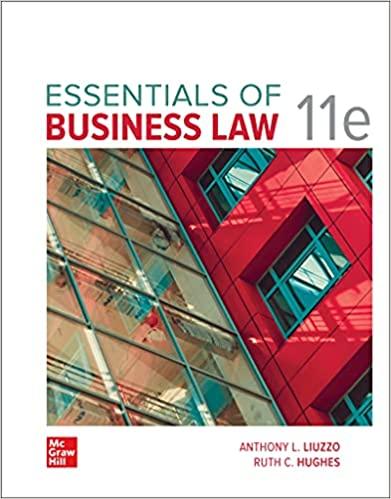Question
The company's e-mail policy stated: All information and documents created, received, saved, or sent on the company's computer or communications systems are the property of
The company's e-mail policy stated: "All information and documents created, received, saved, or sent on the company's computer or communications systems are the property of the company. Employees have no personal privacy right in any material created, received, saved, or sent using company's communication or computer systems. The company reserves the right to access and disclose such material at any time without prior notice." The company presented to Squiggy Dufus, a star salesman, and all other employees a brief statement that consented to monitoring their use of electronic systems whether or not provided by the company. Squiggy refused to sign and was fired. Before leaving, he sent an email to his lawyer from his desk saying he was going to sue for wrongful termination and another to say he was taking a copy of the company's sales manual and his accounts, and some other accounts with him. In order to do that, he photocopied the company's proprietary sales manual and "borrowed" his supervisor's user name and password to access confidential company files. Each of these e-mails included the following notice:
This message is intended only for the use of the Addressee and may contain information that is privileged and confidential. If you are not the intended recipient, you are hereby notified that any dissemination of this communication is strictly prohibited. If you have received this communication in error, please erase all copies of the message and its attachments and notify us immediately.
The company obtained copies of Squiggy's e-mails. It notified him that it had copies of the e-mails to his lawyer. Communications between a client and lawyer are generally protected, but a client waives this privilege if he publicly discloses the information. When Squiggy requested that the e-mails be returned to him unread, the company refused. The company demanded return of the sales manual copy and purloined account files.
What issues are raised under the Electronic Communications Privacy Act?
Who should win, Squiggy or the company and why?
What issues are raised under the Computer Fraud and Abuse Act?
What issues are raised under the Copyright Act?
What are the company's remedies?
What issues are raised under the state's Uniform Trade Secrets Act and/or the federal Defend Trade Secrets Act?
What are the company's remedies?
Step by Step Solution
There are 3 Steps involved in it
Step: 1

Get Instant Access to Expert-Tailored Solutions
See step-by-step solutions with expert insights and AI powered tools for academic success
Step: 2

Step: 3

Ace Your Homework with AI
Get the answers you need in no time with our AI-driven, step-by-step assistance
Get Started


